Lincoln was relatively devoid of personal prejudice, but that doesn’t mean that he didn’t incorporate prejudice into his thinking. ~ Sebastian Page, Oxford University
 By July of 1862, the Union was not faring so well against the Confederacy in its War of Aggression. Although they had won half again as many battles the Southerners, winning thirty-nine battles to the South’s twenty-six, the Southerners had fought them to a stand-still nineteen times, despite being outnumbered by two to one. Many in the North were beginning to grumble about the war, and morale, along with support for the war, was beginning to wane, and sympathy for the Southern cause was building in Western Europe.
By July of 1862, the Union was not faring so well against the Confederacy in its War of Aggression. Although they had won half again as many battles the Southerners, winning thirty-nine battles to the South’s twenty-six, the Southerners had fought them to a stand-still nineteen times, despite being outnumbered by two to one. Many in the North were beginning to grumble about the war, and morale, along with support for the war, was beginning to wane, and sympathy for the Southern cause was building in Western Europe.
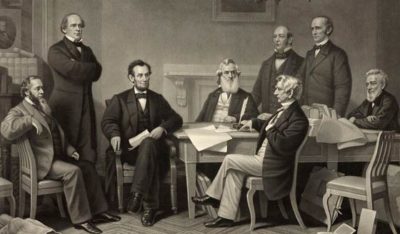
Lincoln and his cabinet, as they were seated at the reading of the proclamation
Lincoln, facing a loss of public support for his war, knew he had to find a way to restore morale and regain the support he was losing, or be forced to stand down and let the Confederate States go. He decided that the best way to do so was to shift the focus of his war away from the political motivation of enforcing the Morrill Tariff by shifting that focus to one of morality. So, in July he proposed to his Cabinet that he issue a proclamation stating that the purpose of the war was to put an end to the institution of slavery in the South. Many of his Cabinet members were apathetic, while others advised him that such a Proclamation was too radical, and Secretary of State William Seward suggested that it would prudent to wait for a substantial Union victory in a major engagement before issuing such a proclamation, in order to show that the Federal government could indeed enforce said proclamation. So Lincoln waited, but as the weeks went by, there was no such victory, and then in September 1862… Sharpsburg.
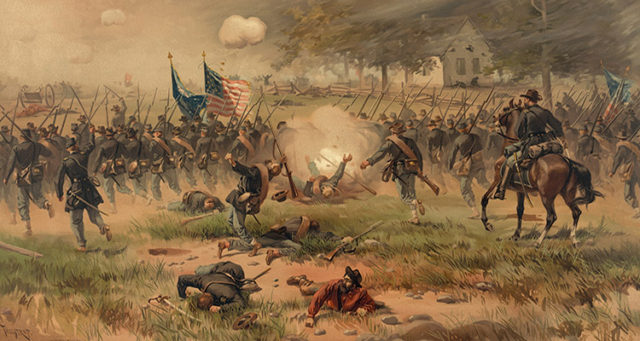 Even though the fighting there on 17 September 1862, was to be recorded as the single bloodiest day in American military history with twenty-three thousand total casualties, four thousand of which were Killed in Action, the Battle of Sharpsburg was inconclusive as to which side was the victor, but it did mark the withdrawal of the Confederate forces from Maryland, which made it a strategic victory for the Union, if nothing else. Lincoln considered the withdrawal of the Confederates from Maryland enough of a “victory” to feel comfortable in issuing Proclamation 93, declaring the objectives of the war including the emancipation of slaves in “rebellious” States, just four days after the battle, on 22 September 1862.
Even though the fighting there on 17 September 1862, was to be recorded as the single bloodiest day in American military history with twenty-three thousand total casualties, four thousand of which were Killed in Action, the Battle of Sharpsburg was inconclusive as to which side was the victor, but it did mark the withdrawal of the Confederate forces from Maryland, which made it a strategic victory for the Union, if nothing else. Lincoln considered the withdrawal of the Confederates from Maryland enough of a “victory” to feel comfortable in issuing Proclamation 93, declaring the objectives of the war including the emancipation of slaves in “rebellious” States, just four days after the battle, on 22 September 1862.
By the time Proclamation 93 was issued, the Union forces were faring no better against the Confederacy. The Confederacy had by that time won thirty-six battles to the Union’s forty-five, and had fought to a draw twenty-four times. So when Lincoln issued the proclamation, it did not, as he had said it would, state, “that the purpose of the war was to put an end to the institution of slavery in the South.” Instead, it stated, “… that hereafter, as heretofore, the war will be prosecuted for the object of practically restoring the constitutional relation between the United States and each of the States and the people thereof in which States that relation is or may be suspended or disturbed.” In other words, the war had been, and would continue to be, waged for the purpose of reclaiming the Confederate States for the Union. It also stated, “That it is my (Lincoln’s) purpose… to again recommend the adoption of a practical measure tendering pecuniary aid to… all slave States… not… in rebellion against the United States, and which… may voluntarily adopt, immediate or gradual abolishment of slavery within their respective limits; and that the effort to colonize persons of African descent with their consent upon this continent or elsewhere, with the previously obtained consent of the governments existing there, will be continued.”
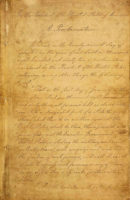
Emancipation Proclamation, Page 1
This meant that he would recommend to Congress that financial aid be given to all Slave States that would accept it and had, or would, voluntarily, immediately or gradually, abolish slavery within their territorial limits, and that efforts to “colonize” blacks in North America or other places, with the consent of those countries’ governments, would be continued. It went on to say that, “… on [1 January 1863] all persons held as slaves within any State or designated part of State… in rebellion against the United States shall be then, thenceforward, and forever free; and the executive government of the United States, including the military and naval authority thereof, will recognize and maintain the freedom of such persons and will do no act or acts to repress such persons, or any of them, in any efforts they may make for their actual freedom.” What this meant was that as of 1 January 1863, all slaves in the seceded States, States where Lincoln had absolutely no legal authority, would be free according to the United States government, and that neither the United States government nor the its military would hinder the actions of any slaves from the South trying to attain freedom.
The proclamation went on to say, “That [I] will on [1 January 1863], by proclamation, designate the States and parts of States, if any, in which the people… shall then be in rebellion against the United States; and the fact that any State or the people thereof shall on that day be in good faith represented in the Congress of the United States… [shall be deemed]… not then in rebellion against the United States.” The gist of this statement was that on 1 January 1863, he, Lincoln, would designate which States, or parts of States, would fall into the category of being “in rebellion,” and that those States represented in Congress by duly elected officials would be deemed “not in rebellion.”
The proclamation then moved to the subject of the “Additional Article of War,” approved by Congress on 13 March 1862: “… officers or persons in the military or naval service of the United States are prohibited from employing any of the forces under their respective commands for the purpose of returning fugitives from service or labor who may have escaped from any persons to whom such service or labor is claimed to be due…” The short of this was that as of 13 March 1862, no United States military personnel could order the return of fugitive slaves to their owners. The proclamation also spoke of an “act to suppress insurrection, to punish treason and rebellion, to seize and confiscate the property of rebels, and for other purposes,” approved by Congress on 17 July 1862, which stated that, “… all slaves of persons who shall hereafter be engaged in rebellion against the Government of the United States, or who shall in any way give aid or comfort thereto, escaping from such persons and taking refuge within the lines of the army, and all slaves captured from such persons or deserted by them and coming under the control of the Government of the United States, and all slaves of such persons found on (or) being within any place occupied by rebel forces and afterwards occupied by the forces of the United States, shall be deemed captives of war and shall be forever free of their servitude and not again held as slaves.”
This meant that as of 17 July 1862, all slaves found escaping from slaveholders in the South, captured from Confederates, or found in Confederate occupied territory would be considered Captives of War and be freed from slavery. This act also stated that, “… no slave escaping into any State, Territory, or the District of Columbia from any other State shall be delivered up or in any way impeded or hindered of his liberty… unless the person claiming said fugitive shall first make oath that the person to whom the labor or service of such fugitive is alleged to be due is his lawful owner and has not borne arms against the United States in the present rebellion not in any way given aid and comfort thereto…” In other words, also effective as of 17 July 1862, any escaped slave would remain free unless that slave’s owner could swear that they had not fought for or helped the Confederacy in any way.
Proclamation 93 ended like this: “… [I] will in due time recommend that all citizens of the United States who shall have remained loyal thereto throughout the rebellion shall, upon the restoration the constitutional relation between the United States and their respective States and people, if that relation shall have been suspended or disturbed, be compensated for all losses by acts of the United States, including the loss of slaves.” This meant that he, Lincoln, would, “in due time,” after the Confederate States had been returned to the Union, recommend that all citizens of the United States who had remained loyal to the Union, and had lost money or property because of acts committed by the United States, be reimbursed for those losses, including the loss of slaves.
So, Lincoln had changed his mind, delaying the “freeing” of slaves in the South in favor of reinforcing the idea that the war was being waged for the purpose of returning the Confederate States to the Union. This would remain, even if unspoken, the secondary cause of the war, implemented to cover the true cause, which was the collection of taxes imposed by the Morrill Tariff. It is true that he had put to writing what he planned to do with the coming of the New Year, but voicing intent is not the same as acting on intent; that would come later. In the meantime, the Union forces would begin to have slightly better luck against the Confederates in battle. But for the moment, let us to return to the phrase in paragraph two of Proclamation 93 that states, “…and that the effort to colonize persons of African descent with their consent upon this continent or elsewhere, with the previously obtained consent of the governments existing there, will be continued.” The “effort to colonize persons of African descent… will be continued.” What exactly did this mean?
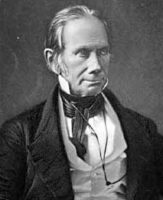
Henry Clay
In 1816, a group of white Americans, consisting of prominent Americans such as United States Representative Henry Clay of Kentucky, of whom Lincoln was a staunch supporter, former United States Representative Daniel Webster of New Hampshire, and United States Representative John Randolph of Virginia, founded the American Colonization Society (ACS). Many kinds of people, ranging from abolitionists to slaveholders, became early members of the Society. The goal of the ACS was to deal with what they considered to be the “problem” of the growing number of free black people in the United States. On 7 January 1822, eighty-six black settlers from the United States founded what would become, in 1824, the West-African Republic of Liberia. Other “colonization” societies purchased land and sent settlers Liberia, to settle in areas close to Monrovia, Liberia’s Capitol city. After the abolition of the trans-Atlantic slave trade, the United States Navy put Africans removed from slave ships ashore in Liberia. By 1838 Liberia had a population of approximately twenty thousand. In 1847, Liberia declared its independence and the envisioned mass exodus of blacks from the United States to Liberia never transpired. However, the idea of “colonizing” black Americans elsewhere did not fade.
While he was considering emancipation, Lincoln was also considering colonization. Lincoln was obsessed with separating the white and black races, and had decided that the best way to achieve his goal was to persuade free black Americans to voluntarily join the colonization effort, to “lead by example” and thereby pave the way for ridding the country of freed slaves. This way, he could wash the United States clean of the original sin of slavery and not have be constantly reminded of it by living alongside those that had been enslaved. So, with a budget of six hundred thousand dollars allocated to him by Congress for the purpose of colonization, on 14 August 1862, one month and eight days before issuing Proclamation 93, he received a delegation of free black men, leaders in their communities, to “discuss” the “problem” at the White House. The delegation’s chairman, Edward M. Thomas, was a messenger to the House of Representatives and a respected cultural leader in Washington’s black community, a Freemason and a member of the influential Social, Civil, and Statistical Association (SCSA) in Washington, known for his collections of fine arts, coins, and a personal library of almost six hundred volumes. With him were John F. Cook Jr., a local school leader who had studied at Oberlin College, and also a Freemason and member of the influential SCSA, John T. Costin, another Freemason, Cornelius Clark, another member of the SCSA, and Benjamin M. McCoy, a teacher and leader in the Asbury Methodist Episcopal Church in Washington.
What Lincoln had to say to these men wasn’t really so much of a discussion as it was a lecture. He said, “You and we are different races. We have between us a broader difference than exists between almost any other two races. Whether it is right or wrong I need not discuss, but this physical difference is a great disadvantage to us both, as I think your race suffer very greatly, many of them by living among us, while ours suffer from your presence. In a word we suffer on each side. If this is admitted, it affords a reason at least why we should be separated.” There is no question that blacks, even free blacks, suffered from living among whites in America at that time. Slavery, even if not abusive, is synonymous with suffering, as one has no freedom. Free blacks suffered because they were paid lower wages, if they could find work, and they were not accorded the same rights as free whites. But for Lincoln to say that whites suffered because of the mere presence of blacks among them was intolerable. Verbally, it does not get much more racist than that. He continued to say, “I do not propose to discuss this, but to present it as a fact with which we have to deal. I cannot alter it if I would. It is a fact, about which we all think and feel alike, I and you.” Lincoln wasn’t even willing to discuss the ability of blacks and whites to live together in harmony; to him it was an impossibility that simply had to be dealt with. And it was very presumptuous of him to tell these men how they themselves felt about the subject.
Lincoln went on to blame black people for the War of Northern Aggression, saying, “See our present condition – the country engaged in war! – our white men cutting one another’s throats, none knowing how far it will extend; and then consider what we know to be the truth. But for your race among us there could not be war, although many men engaged on either side do not care for you one way or the other. Nevertheless, I repeat, without the institution of Slavery and the colored race as a basis, the war could not have an existence.” The man was as racist as they come, and a hypocrite to boot. It was the Morrill Tariff that caused secession, and the desire to collect those taxes from the South that drove the Union to war, and Lincoln, as the driving force behind that desire, knew it; ending slavery was not an issue at the time. Lincoln himself made it an issue four and one-half months later when he issued the Emancipation Proclamation, and he only did it then because it was the only way the self-righteous, fodder-swallowers in the North, some of whom were hypocritical slave-holders, would continue to support the war, and the only way to keep Great Britain and France from interceding on the Confederacy’s behalf.
Lincoln continued, saying, “I suppose one of the principal difficulties in the way of colonization is that the free colored man cannot see that his comfort would be advanced by it. You may believe you can live in Washington or elsewhere in the United States the remainder of your life [as easily], perhaps more so than you can in any foreign country, and hence you may come to the conclusion that you have nothing to do with the idea of going to a foreign country. This is an extremely selfish view of the case. But you ought to do something to help those who are not so fortunate as yourselves.” He went on, explaining, “If you could give a start to white people, you would open a wide door for many to be made free. If we deal with those who are not free at the beginning, and whose intellects are clouded by Slavery, we have very poor materials to start with. If intelligent colored men, such as are before me, would move in this matter, much might be accomplished. It is exceedingly important that we have men at the beginning capable of thinking as white men, and not those who have been systematically oppressed.”
Lincoln thought that if these free black men, leaders in their communities, would lead the immigration of black people out of the United States that white slaveholders would free their slaves so that they could immigrate, just to rid of them. Just how he thought black slaveholders would react is anyone’s guess, but regardless, it was a bit egotistical of him to believe he knew what was in the hearts and minds of everyone else in the United, and Confederate, States of America. And to imply that those held in slavery were unintelligent, while the free blacks were “capable of thinking as white men” was an incredibly insensitive insult to all blacks.
Continuing to try and sell these men on leading a mass immigration of black people out of the country, Lincoln told them, “There is much to encourage you. For the sake of your race you should sacrifice something of your present comfort for the purpose of being as grand in that respect as the white people.” It seems as though the man couldn’t open his mouth without a racist insult spewing forth. Lincoln’s true colors were surely shown on that day.
After going on to review the pros and cons of the blacks immigrating to Africa, Liberia in particular, as it had originally been a colony of black Americans, Lincoln then started extolling the virtues of certain locations in Central America, his choices for relocation destinations. Part of his reasoning behind sending them to Central America instead of Liberia was that Central America was closer to their American birthplaces than was Africa, and that even if they weren’t fond of white people, it would be understandable if they wanted to stay closer to their, albeit in some cases forcibly adopted, “motherland.” What Lincoln didn’t mention was that he had already been working in secret to purchase land, on which to found a colony, in Chiriquí, in present-day Panama, but at that time a part of Colombia. Exempting himself, in a profoundly narcissistic manner, he said, “It does not strike me that you have the greatest reason to love [white people]. But still you are attached to them at all events.” A statement true of some, perhaps, but not all. Some of the older black people could very well have been born in Africa, in which case they may not have been “attached” to whites at all, in any way. Of course those born in America, whether free or enslaved, were indeed Americans. Explaining more about why he thought a colony in Central America would be a good idea, he said, “It is nearer to us than Liberia – not much more than one-fourth as far as Liberia, and within seven days’ run by steamers.
Unlike Liberia it is on a great line of travel – it is a highway. The country is a very excellent one for any people, and with great natural resources and advantages, and especially because of the similarity of climate with your native land – thus being suited to your physical condition.” He argued that, “Coal land is the best thing I know of with which to commence an enterprise.” Lincoln argued, saying that the one thing the races had in common was that they “look to their self-interest.”
In closing, Lincoln said, “If you will engage in the enterprise I will spend some of the money intrusted to me. I am not sure you will succeed. The Government may lose the money, but we cannot succeed unless we try; but we think, with care, we can succeed. If I could find twenty-five able-bodied men with a mixture of women and children, good things in the family relation, I think I could make a successful commencement.” He then ended his “discussion,” leaving the delegation to think about it “for the good of mankind.” The bottom line was that Lincoln needed these men to enlist in his efforts if he was ever to see his dream of an America free of black people come to fruition. The plan, already in motion, could potentially relocate over ten thousand free black Americans to the land in Chiriquí which the United States government was attempting to purchase.
By the time Lincoln issued the famous “Emancipation Proclamation,” Union forces had won fifty-six of the one hundred and twenty-five battles fought, while the Confederacy had won forty-four, with twenty-five being stalemates. But even with these numbers, the Union still wasn’t doing as well as was expected, especially considering that they outnumbered the Confederates by about two to one, and were better equipped. By issuing the Emancipation Proclamation Lincoln hoped to make freedom for slaves a legitimate war aim in the eyes of the public.
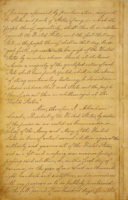
Emancipation Proclamation Page 2
Lincoln held true to his word, and on 1 January 1863, he issued Proclamation 95, the Emancipation Proclamation. Actually, there several reasons that Lincoln issued the proclamation. He wanted to shift the public focus on the war from one of politics, to one of morality. He was in a difficult position militarily, because despite outnumbering the enemy by two to one or better and being better equipped, Union forces were not doing as well as the Northern public felt they should have been. As a result, many in the North were complaining about the cost and longevity of the war, and support was falling off. Lincoln hoped that by changing the focus of the war to one of morality that support for the war would be revived in the North. Also, Great Britain and France were considering giving aid to the Confederacy in hopes of expanding their influence in the Western Hemisphere, although many Europeans were against slavery. Lincoln hoped that by shifting the focus of the war to ending slavery in America that the European nations would refuse to lend aid to the Confederacy. It worked. Although many Europeans saw the Emancipation Proclamation as not only overly limited but reckless as well, it helped shift the international mindset away from intervention.
Proclamation 95, the Emancipation Proclamation, regarding the status of slaves in States engaged in “rebellion” against the United States, was issued on 1 January 1863. The States that Lincoln named as being “rebellious” were Arkansas, Texas, Louisiana, Mississippi, Alabama, Florida, Georgia, South Carolina, North Carolina, and Virginia. For some unknown reason, Tennessee was excluded. Excepted were several parishes in Louisiana, including the city of New Orleans, and quite a few counties in Virginia, including the fifty counties in Western Virginia that were to unconstitutionally become the State of West Virginia in June of 1863. After designating the “rebellious” areas, the proclamation went on to state that, “… I do order and declare that all persons held as slaves within said designated States and parts of States are and henceforward shall be free, and that the executive government of the United States, including the military and naval authorities thereof, will recognize and maintain the freedom of said persons.” This meant that Lincoln declared that all slaves in the designated areas were free, and that the government and military of the United States would recognize and maintain that freedom. Being careful to respect the limits of his authority in the United States, Lincoln applied the Emancipation Proclamation only to the Southern States, where he had no authority at all. The proclamation went on to say that, “… I hereby enjoin upon the people so declared to be free to abstain from all violence, unless in necessary self-defense; and I recommend to them that in all cases when allowed they labor faithfully for reasonable wages,” which meant that he urged the freed slaves to refrain from any form of violence, unless in self-defense, and to get a job if they could and give an honest day’s work for an honest day’s pay. It also proclaimed that that freed slaves of “suitable condition” could join the United States military by saying, “… such persons of suitable condition will be received into the armed service of the United States to garrison forts, positions, stations, and other places and to man vessels of all sorts in said service.” It was Lincoln’s hope that because of his voiced intent to free the slaves in the South through military means that those slaves would revolt, and possibly join and support the Union. What he did not understand was the relationship between most Southern slaveholders and their slaves; the “revolt” never happened.
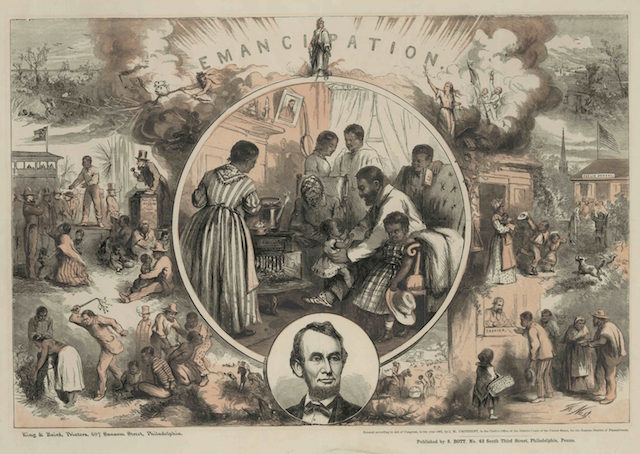 Lincoln would, in time, come to be heralded as the “Savior of the Union” and the “man who freed the slaves.” He claimed to consider the Emancipation Proclamation to be the most important aspect of his legacy. Of it he said, “I never, in my life, felt more certain that I was doing right, than I do in signing this paper. If my name ever goes into history it will be for this act, and my whole soul is in it.” But nothing was said in Proclamation 95, or, if you will, the Emancipation Proclamation, about giving financial aid to all Slave States in order that they should voluntarily abolish slavery within their territorial limits, as had been mentioned in the preliminary proclamation. As a matter of fact, nothing was said about abolishing slavery anywhere except in the Southern States.
Lincoln would, in time, come to be heralded as the “Savior of the Union” and the “man who freed the slaves.” He claimed to consider the Emancipation Proclamation to be the most important aspect of his legacy. Of it he said, “I never, in my life, felt more certain that I was doing right, than I do in signing this paper. If my name ever goes into history it will be for this act, and my whole soul is in it.” But nothing was said in Proclamation 95, or, if you will, the Emancipation Proclamation, about giving financial aid to all Slave States in order that they should voluntarily abolish slavery within their territorial limits, as had been mentioned in the preliminary proclamation. As a matter of fact, nothing was said about abolishing slavery anywhere except in the Southern States.
This fact brings into question Lincoln’s sincerity about the complete abolition of slavery in America as there were still two Slave States in the Union, and the Border States, of which there were four, were Slave States. The following table shows the division of States from 1863 to 1865:
Union States, Districts, and Territories by Alphabet
California
Connecticut
Illinois
Indiana
Iowa
Kansas
Maine
Massachusetts
Michigan
Minnesota
Nevada
New Hampshire (Slave State)
New Jersey (Slave State)
New York
Ohio
Oregon
Pennsylvania
Rhode Island
Utah, Territory of (Slave Territory)
Vermont
Washington, District of Columbia (Slave District)
West Virginia (Slave State)
Wisconsin
Border (Slave) States by Alphabet
Delaware
Kentucky (Seceded 20 November 1861; Split by Union occupation)
Maryland
Missouri (Seceded 31 October 1861; Split by Union occupation)
Confederate States by Date of Secession
South Carolina: 20 December 1860
Mississippi: 9 January 1861
Florida: 10 January 1861
Alabama: 11 January 1861
Georgia: 19 January 1861
Louisiana: 26 January 1861
Texas: 1 February 1861
Virginia: 17 April 1861
Arkansas: 6 May 1861
North Carolina: 20 May 1861
Tennessee: 8 June 1861
Missouri: 31 October 1861 (Split by Union occupation)
Kentucky: 20 November 1861 (Split by Union occupation)
This puts the “Great Emancipator” and his war in a bit of a different light. So do his continued efforts towards “colonization.”
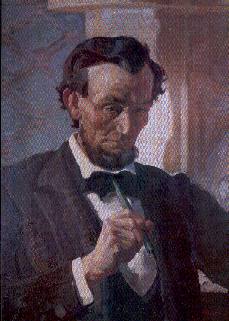 On New Year’s Eve 1862, Lincoln held late-night negotiations with entrepreneur Bernard Kock, Francis P. Blair, Sr., the founder of the Congressional Washington Globe and Washington powerbroker-turned-colonizationist, and Senator James Doolittle of Wisconsin, during which a plan was conceived to found a colony of some five thousand free black men, women, and children a small island called Ile a Vache, off Haiti, the title to which Kock had obtained from the Haitian government. Lincoln is reported to have signed the Haitian colonization contract mere hours before signing Proclamation 95, his famous “Emancipation Proclamation.”
On New Year’s Eve 1862, Lincoln held late-night negotiations with entrepreneur Bernard Kock, Francis P. Blair, Sr., the founder of the Congressional Washington Globe and Washington powerbroker-turned-colonizationist, and Senator James Doolittle of Wisconsin, during which a plan was conceived to found a colony of some five thousand free black men, women, and children a small island called Ile a Vache, off Haiti, the title to which Kock had obtained from the Haitian government. Lincoln is reported to have signed the Haitian colonization contract mere hours before signing Proclamation 95, his famous “Emancipation Proclamation.”
On the morning of 14 April 1863, the USS Ocean Ranger set sail from Fort Monroe, Virginia, with four hundred and fifty-three free black Americans, along with food and other supplies, for Ile a Vache. Three days out of Fort Monroe, there was an outbreak of smallpox aboard the vessel. By the time the Ocean Ranger reached Ile a Vache on 3 May, twenty-odd passengers had been infected. Upon their arrival, they found the island drastically unprepared to accept the colony. Only two small dwellings had been built, and the “settlement” was chronically undersupplied. A second supply ship, laden with additional food and lumber never sailed.
Further Study: Remarks on Colonization, August 14, 1862
Bernard Kock had been retained to lead the voyage because he possessed the colony’s title, obtained by him from the Haitian government. Upon landing on Ile a Vache, he declared himself governor of the colony and presented the colonists with contracts that bound them to labor. He also forced them into exchanging their money and valuables for scrip of his own design. This would become the only tender he would use to pay wages to the colonists, which they then must spend for food and goods in a “company shop” arrangement, at an enormous profit to Kock himself. Those colonists afflicted with smallpox were quarantined to what was referred to as a “hospital zone” on the beach, and abandoned without any supplies. Kock, it seems, viewed the colonists as servants, indentured to him personally, and instead of constructing houses for the settlement, had purchased shackles for the further oppression of the colonists whom he intended to cultivate cotton for him on his own private “sea cotton farm.” The immigrants, of course, resisted, and according to reports, “dozens” died.
On 25 June 1863, secondhand reports concerning the situation on Ile a Vache were received in a letter from James DeLong, United States Consul in the nearby Haitian port of Aux Cayes. Even though the fact that DeLong’s son was invested in a competing colonization effort demands that DeLong’s testimony be taken as potentially biased, it was a thoroughly damning account of the situation at the colony and of Kock himself: “Everything connected with the affairs on the Island is kept in the dark as much as possible. No person is permitted to land on the Island without a passport except parties immediately connected with Mr. Kock in business.” Included was an account from a witness who reported seeing the colonists in “absolute destitution, sleeping on open beaches and ramshackle huts.” Also enclosed was a sample of Kock’s self-printed currency.
Yet it was February of 1864 before President Lincoln sent a relief vessel, the USS Marcia Day, to the island colony to rescue the survivors. Aboard the Marcia Day was Special Agent of the Department of Interior D. C. Donnohue. Special Agent Donnohue landed on Ile a Vache to find the remaining settlers clothed in the very same ragged surplus Union army uniforms they had worn when they had departed from Fort Monroe ten months earlier. Of the original four hundred and fifty-three colonists, only two hundred and ninety-two remained on the island. Seventy-three, it turned out, had fled the island for the Haitian mainland, and the other eighty-eight had succumbed to smallpox and starvation, or had been killed in the initial resistance to Kock’s “rule.”
When the USS Marcia Day steamed up the Potomac River on 20 March 1864, and delivered the survivors of the Ile a Vache colonization attempt to Alexandria, Virginia, finger-pointing and blame-throwing for the whole debacle was well under way. It had been believed, by the public at least, that Lincoln had denounced the practice of colonization after signing the Emancipation Proclamation over a year before, yet here was living proof that he had not. It was soon discovered that Lincoln had also considered attempting to set up colonies of free black Americans in what are now the countries of Guyana, Belize, and Panama.
Further Study: Lincoln, Colonization and the Sound of Silence
The colonization plan collapsed after the disaster on Ile a Vache, for two primary reasons. First, Congress voted to remove funding for the project, and second, the British, who had assisted with the plan, became fearful that the Confederacy might possibly win the war, reverse emancipation, and regard the British agents who had assisted in the plan as thieves, possibly leading to execution. Still, in autumn of 1864 the United States Attorney-General sent a letter to Lincoln that said, “… further to your question, yes, I think you can still pursue this policy of colonization even though the money has been taken away,” proving that Lincoln was still exploring the possibilities of implementing the policy. Who knows what would have happened had he lived…
September 28, 2017
K. Lance Spivey
Deo Vindice
